|
|
| 'Like' us on Facebook | Follow us: |
Posted on: July 20, 2014
MUSINGS ON THE GITA - 07
by Prof. G. Venkataraman
The Bhagawad Gita was delivered by Lord Krishna to the warrior prince Arjuna on the battlefield of Kurukshetra as an antidote to the dilemma that arose in him. It was not a choice between right and wrong, rather it was dilemma between the 'apparently' right and 'absolutely' right. Five thousand-odd years later the wisdom of the Gita is still not lost in context in modern times. In fact it is more relevant and needed now than ever.
No wonder then that when the Lord incarnated again as Bhagawan Sri Sathya Sai Baba He did not fail to emphasise the importance of this spiritual treatise. Apart from giving us an entire volume of commentary on the Bhagawad Gita in the Gita Vahini, Baba also has delivered a number of discourses on this classic text. For instance, during August–September 1984, Baba gave a series of 34 discourses on The Bhagawad Gita inside the Bhajan Hall in Prasanthi Nilayam (these have been aired on Radio Sai several times).
Presently we bring you this musing series by Prof. G. Venkataraman which is on the 'Essence of the Gita'. In this modern age of rationalism we tend to refuse to accept anything that is not offered on the platter of scientific approach. And that is what makes this presentation by an eminent scientist a work of unquestionable relevance. He has infact authored a comprehensive book on the Gita: Conversation Between God and Man, which is popular as much for its profundity as its lucid and simple-to-understand conversational style.The current series of articles is actually an adaptation of a radio series that was produced and aired on Radio Sai on the request of our listeners. In these episodes too Prof. G. Venkataraman has dealt with the teachings of the Gita in a practical, scientific and thematic manner which makes for interesting reading and easy understanding.
 |
Loving Sai Ram and greetings from Prasanthi Nilayam.
I welcome you to my seventh article in the Gita series. Just to remind you once more, the focus in this series is mostly on the Mama Dharma aspect of the Gita since, according to Swami, that is the real essence of the Gita. In simple terms, Mama Dharma boils down to doing one’s duty paying attention to the permanent aspect underlying one’s actions rather that the transient aspects, however important and pertinent the latter might appear at first sight. In short, in some manner or the other, what I was telling you thus far had largely to do with duty, and doing it for God’s sake.
In this article, I wish to change the gear somewhat, and deal with the following question:
“Does following Mama Dharma have anything to do with Creation and man’s position in the scheme of things in Creation?”
If you recall, Krishna gave an early hint of this in Chapter 3 or 4, I cannot recall which at this moment. But I do recall what Krishna said then. He said, to paraphrase, “O man, remember you are a part of the Cosmos, created by the Creator. There is thus a cosmic aspect to your form and personality. In the Cosmos, there are millions of entities, each of which has a role to play, and that includes you. So, when you act, you must never forget the cosmic aspect of your existence. Everything that you do must be in total harmony with Creation.”
Swami too has been drawing attention to this aspect lately, in His own way of course. I have mentioned this in many of my talks, and just to remind you, Swami says that man is a part of Society, which is a part of Creation, which in turn is a limb of God. Thus, man’s actions, both at the individual and the collective levels, must never harm either Society or Nature or both. Such actions would be unacceptable to God. In this talk, I wish to explain how Krishna deals with this subject, and after doing so, I wish to relate it all, as I try to do frequently, to Mama Dharma.
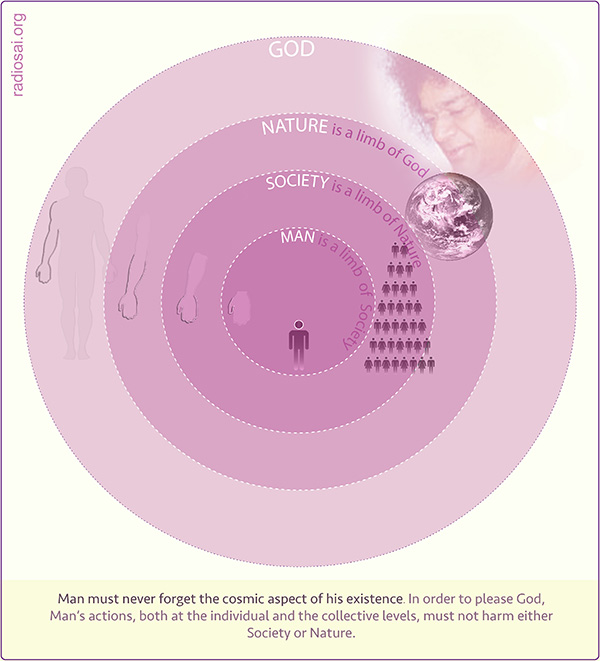 |
To start with, I shall race through Chapters 7, 8 and 9, offering glimpses of man and his relationship to Creation and the Creator. Chapter 7 is called Jnana-Vijnana Yoga, meaning the Philosophy of Unmanifested and Manifested Divinity.
Relationship Between Creation and the Creator
Let me now quote for you some of the important Slokas. In this and the following two chapters, Krishna delineates briefly, the hierarchy in Creation. If there is Creation, then clearly there must be a Creator. What if any is the relationship between the Creator and His Creation? Let us hear Krishna explain all that to Arjuna. To help you with the Slokas, please keep the following points in view.
-
1. Whether there is a Universe or not, Creator always exists because He is Eternal.
-
2. When the Creator brings forth Creation or creates a Universe to put it differently, Divinity always pervades Creation, every aspect of it, from the microcosm to the macrocosm.
-
3. Divinity is present in Creation in two forms, as the manifest aspect and as the Unmanifest aspect. Both play their own roles.
-
4. Universes come and go, that is to say after they have done their job, they dissolve into something. What is that something? That, says Krishna, is His Subtle but Eternal aspect. It is Supreme, totally unmanifest, without form, is the Cause of everything, and is the Ultimate, Ultimate so to speak.
By the way, this last entity, the Ultimate, Ultimate is what religions speak of Almighty God, while Vedanta refers to it as Parabrahman or simply as Brahman at times. Please keep all these important points in view. With this small preface, let me now plunge into the key Slokas of Chapter 7.
-
This Prakriti is My lower material aspect but know thou, O Mahabahu, that distinct from this is My other and higher spiritual aspect, Jiva or life-principle, by which this entire Universe is sustained. [7.5]
Note that through this Sloka, the Avatar is drawing attention to the dual aspect of the presence of Divine forces in the Universe. We see inanimate but absolutely wonderful objects like galaxies, neutron stars and what not in the Universe. God pervades them all without exception and that is why extra-ordinary things happen even in the inanimate world. At the same time, when we see living entities, we ought to see in them a subtler aspect of the Divine come into play, the so-called Life-Force or Praana Shakti. As early as Chapter 4, Krishna told Arjuna that He is the power that digests the food that all creatures eat; now He stresses that message again. Let me move on.
-
Know ye that these two aspects are the wombs of all beings and that I ultimately am the One from Whom the entire Universe evolves and into Whom the Universe finally dissolves. [7.6]
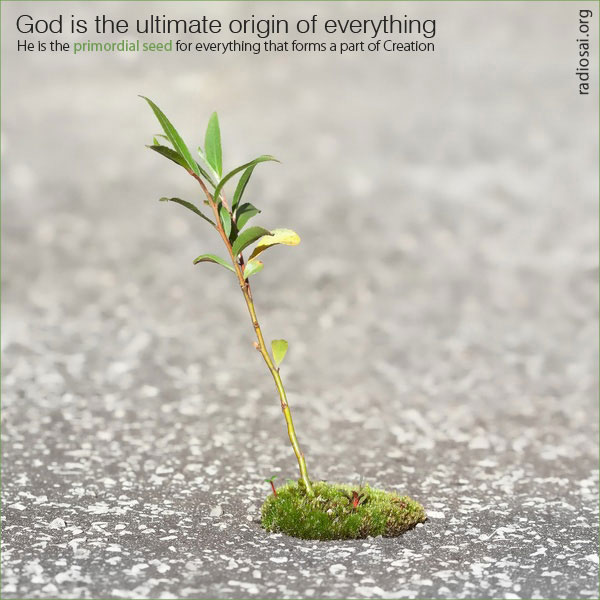 |
This Sloka makes it abundantly clear that God is the Ultimate origin of everything. In other words, He is the ultimate, primordial seed for everything that forms a part of what we normally call Creation.
-
There is nothing whatsoever higher than Me, O Dhananjaya; all this strung on as a row of pearls. [7.7]
This is an important Sloka and needs some attention. What the Lord is saying is that many wonderful things happen in Nature, in fact all the time. They all happen because of His design and as a part of His overall Master Plan. These days, man is used to dismissing all this as merely natural phenomena, entirely explainable by the laws of Nature.
At a certain level that is indeed true. God does run the Universe according to laws of Nature as we call them, and in fact God has enabled man to discover a good many of these laws through scientific investigations and explorations. That said, it still remains, that it is God who ordained these laws to be operative in a certain way. Few realise that if God had made some small changes in these laws, there might have been no life at all! Some philosophers link this to the question: “Does the Universe have any purpose?” I hope to deal with it later. Moving on,
-
O Kaunteya, in water I am the fluidity; in the Sun and the Moon I am the effulgence; in the Vedas, I am the principal syllable AUM; in air, sound; and in man, virility. [7.8]
-
I am the sweet fragrance of the earth, the brilliance of fire, the life-force in all beings and the austerity in ascetics. [7.9]
These two Slokas are a sample of a good many that we find across the pages of the Gita. Through such Slokas the Lord reminds man again and again. He says in effect:
“O man, don’t be fooled. Behind the seen lies the unseen. You see birds fly and think you can explain it all with biology and physics. Yes, birds have a biological structure that enables them to use certain laws of physics and rise in the air. Yes, thinking about it all, man too has been able to invent the aeroplane and fly across the skies. But man, do not get drunk with your achievements. May be thousands cross the oceans every day by planes but remember, in all these phenomena and achievements, I am always present in a subtle and invisible form. That is my Transcendental presence in this Universe. The birds are the way they are, because of Me; and you are able to fathom how birds fly because it is I who endowed you with the intelligence to comprehend those complicated natural phenomena. And, O man, you are able to build aeroplanes because I gave you the intelligence to do so! Thus, My signature is there all over the place, but if you are filled with ego then you can easily miss My subtle presence; of that be warned!”
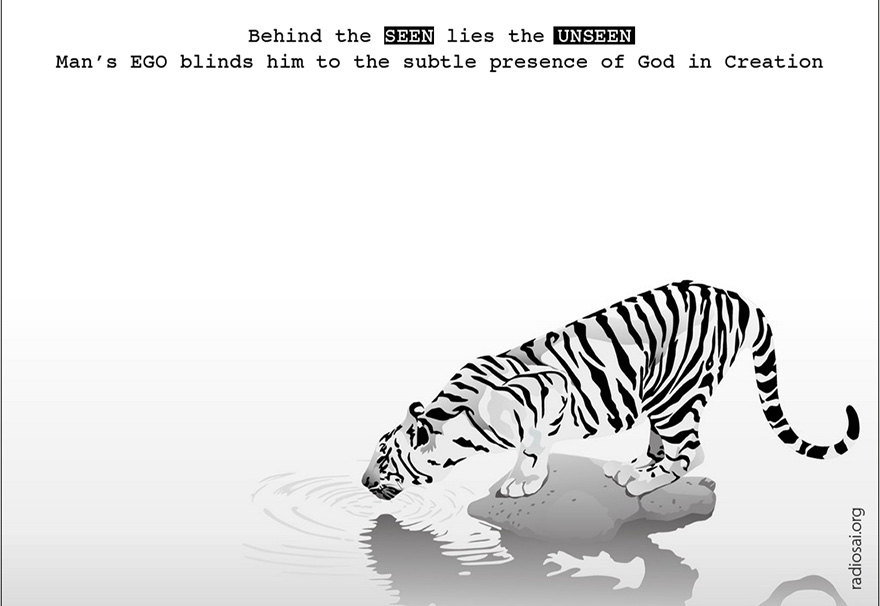 |
Let us continue with the Slokas of Chapter 7.
-
Unaware of My Infinite, Transcendental, Supreme and Imperishable nature, people lacking in discrimination think of Me only in terms of My finite form. [7.24]
-
I am not manifest to all, concealed as I am by My creative power [Yogamaya]; the bewildered world does not recognise Me, birthless and changeless. [7.25]
These words of warning given five thousand years ago, become even more pertinent now when man, drunk with his so-called success, seems to feel that he no longer needs God and dismisses God in human form.
Beyond the Physical Universe
I turn now to Chapter 8 entitled Akshara Brahma Yoga, meaning the Philosophy of the Imperishable Brahman. If in Chapter 7 the Lord talks about how Divinity pervades the physical Universe both in manifest and subtle forms, in Chapter 8 the Lord gives a glimpse of what lies beyond the physical Universe, that is to say the Source from which the Universe issues forth and to which the Universe returns and dissolves when the Lord decides that time is up for the Universe. In this manner, the Lord makes it very clear that while Universes may come and go, He goes on forever, which, of course, is to be expected since God is Eternal. Before giving a glimpse of what lies beyond the physical Universe, Krishna begins by explaining how He is present at various levels in each one of us.
-
The Supreme and the Imperishable is Brahman; its manifestation in the individual body is Adhyatma; and the entire creative process whereby beings are created is Karma. [8.3]
-
Adhibhuta is My perishable form; Adhidaiva is the Supreme Divine Agent and here in this body, I am Adhiyajna the spirit of sacrifice; I am in all. [8.4]
And now to the Source of it all.
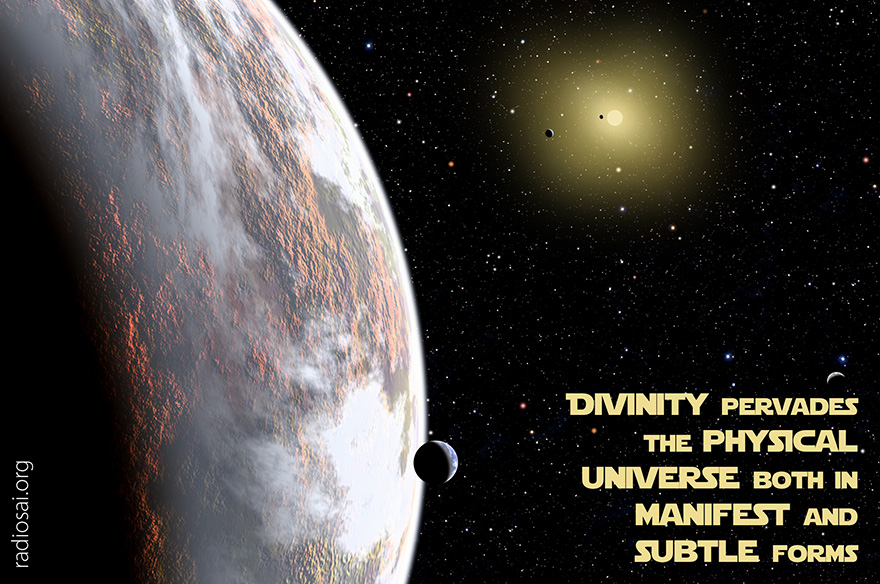 |
-
From the Unmanifest issue forth at the dawn of each Cosmic Day, all manifested beings and at each Cosmic Night dissolve back into it. [8.18]
-
O Partha, the same multitude of beings come to birth again and again; and at the coming of Cosmic Night, whether they will or not, they are dissolved only to remanifest again next Cosmic daybreak. [8.19]
-
But higher than this state into which all beings dissolve at Cosmic Night, is yet another Unmanifest Being, everlasting, and which perisheth not even when all creatures are destroyed. [8.20]
-
Called the Imperishable, this Superior Unmanifest is the Ultimate Goal. For those who reach It, there is no return to the manifested Universe. That Imperishable Superior Manifest is My Abode. [8.21]
-
That Supreme Being can be attained by unswerving devotion to Him. In Him dwell all beings and by Him all is pervaded. [8.22]
The Lord is eternal while we mortals go through cycles of birth and death. Is there no end to this apparently endless recurring cycle? The Lord gives the answer.
-
Whosoever remembers Me at the time of death, merges in Me; of that there is no doubt. [8.5]
-
O Kaunteya, whatever entity a man contemplates at the time of death, into that very form he goes in the next birth. [8.6]
-
Therefore, at all times remember Me and fight. With mind and reason thus fixed on Me, thou shalt surely come to Me. [8.7]
-
With thoughts steadied by constant practice and Mind not wandering aimlessly, he who meditates on the Supreme Being goes to Him. [8.8]
Through these Slokas, Krishna essentially says the following:
-
1. Go through life always thinking of Me.
-
2. In practical terms always do your duty but do so thinking of Me; then work becomes worship.
-
3. If you get used to thinking of Me always, then you would unfailingly do so at the very last minute too.
-
4. And if you give up your body thinking of Me at the very last minute, then you will merge with Me for sure; in turn this means no rebirth.
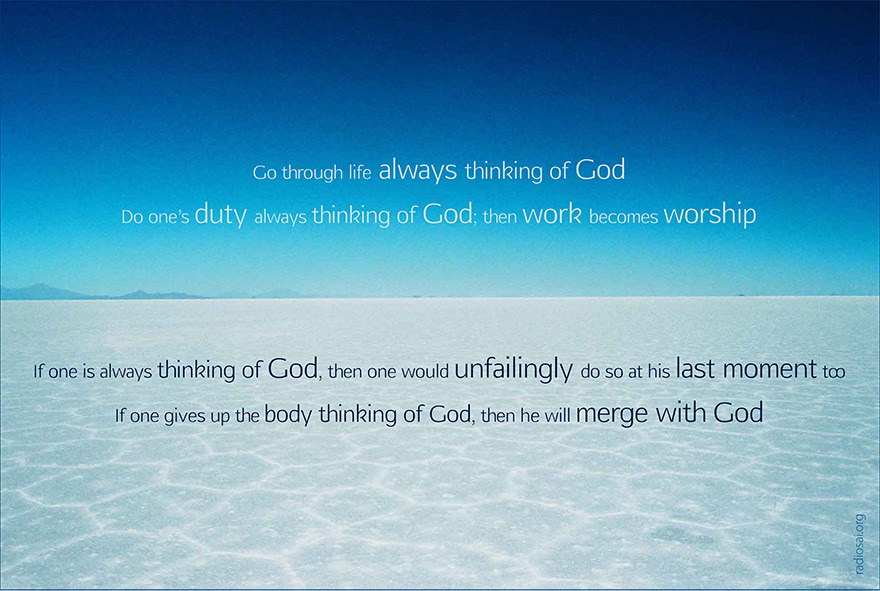 |
As regards liberation from repeated birth and death, Krishna leaves no room for doubt in Sloka 9.28. He says:
-
So doing [by being immersed in Me], thou shalt be totally released from bondage of action; with Mind thus firmly set in renunciation, thou shalt come to Me and thus be freed from recurring birth and death.
I hope that is clear.
The Supreme Secret
Now for a quick look at Chapter 9 which is entitled Rajavidya Rajaguhya Yoga, meaning the Philosophy of the Royal Path and the Supreme Secret. In this Chapter, Krishna essentially tells Arjuna, “Listen, you just pay attention to what I am going to say now and you would be OK!”
As usual, let me first do a quick run over the important Slokas of this Chapter. I start with one in which Krishna declares that those who do not have faith in the Omnipresence of Divinity will have to face repeated births and deaths. He says:
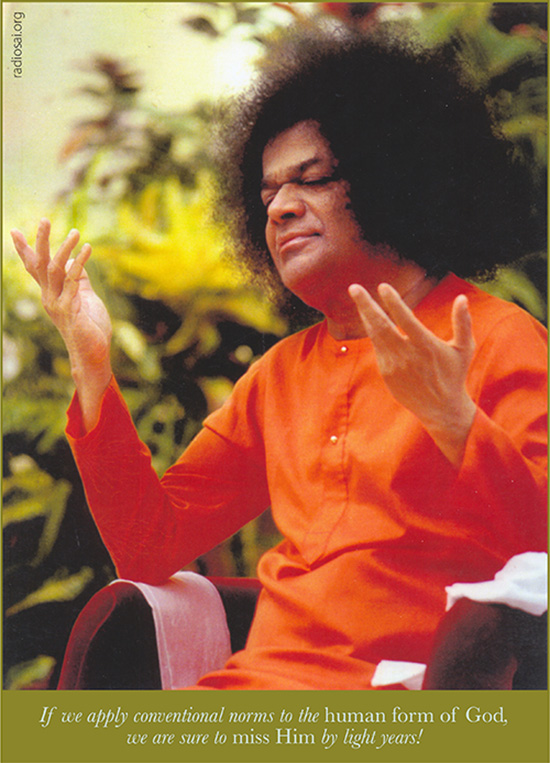 |
-
Men lacking faith in this doctrine, O Parantapa, far from coming to Me, return repeatedly to the path of recurring death. [9.3]
This lack of faith extends to the human form of God also, that is faith in Avatars. Concerning this, Krishna says:
-
Not knowing My transcendent nature as the Sovereign Lord of the entire Universe, fools slight Me when I incarnate in diminutive human form. [9.11]
-
Vain are the hopes, actions and knowledge of those witless ones who have embraced a fiendish, demonical and derisive attitude. [9.12]
It is important to pay attention to these two Slokas for they warn us how easily we can be fooled by merely looking at the human form of the Avatar. As we all know, Swami declared His Avatarhood way back in 1940 when His body was just fourteen years old. And He did so in a very rural part of a country that was supposed to be backward, at least materially.
So there is no wonder that Swami’s Divinity was generally very much in doubt in those days, not withstanding the miracles He often performed. That was because His actions were frequently most inscrutable; indeed, they often defied what we would call common sense and elementary logic. Swami continues to confuse in that manner even today, His actions being profoundly Divine at one moment and seemingly illogical at the very next. But then, that is the Avatar, always testing the credibility of our devotion.
This aspect of the Avatar often doing things that appear to go against normal human logic is what easily confuses mortals. Commenting on this most mysterious aspect of His, Swami once said to Kasturi, “Even Balarama could not understand Me; how can you?!” Now this is a significant remark that we would do well to ponder over.
If you recall, Balarama in the Krishna Avatar was none other than Lakshmana in the Rama Avatar. Always behind Rama as a shadow, Lakshmana went down in history as a devotee par excellence. We have heard Swami praise him so many times. And yet when that same Lakshmana came again with the Lord in the Dwapara Yuga, this time bearing the form of Balarama, he had serious differences of opinion with Krishna on some crucial matters, especially when it came to Krishna’s treatment of Duryodhana. I am mentioning all this just as a reminder to all of us that if we apply conventional norms to the human form of God, we are sure to miss Him by light years.
Yes, the human form the Avatar certainly bears, and human He certainly is in many respects. He is perfect but would deliberately act imperfect on many occasions just to make us accept Him as one of us. It is because of that, Arjuna took so many liberties with Krishna for over seventy and odd years till one day the Lord revealed His true form. What I am driving at is that just because Swami often acts as if He forgets or as if He does not know something, etc., we ought not to take that seriously. Many people do and end up saying one thing to Swami and doing something entirely contradictory behind His back, imagining that Swami does not know or would not know. He always knows – that is His Omnipresence and Omniscience. But He would act as if He does not know anything! And promptly we get fooled. Yet there are others of deep faith who are never fooled come what may and about them, this is what the Avatar has to say:
-
But the truly great ones, O Partha, guided by their Divine nature and knowing Me as the Imperishable Source of all beings, worship Me with devotion. [9.13]
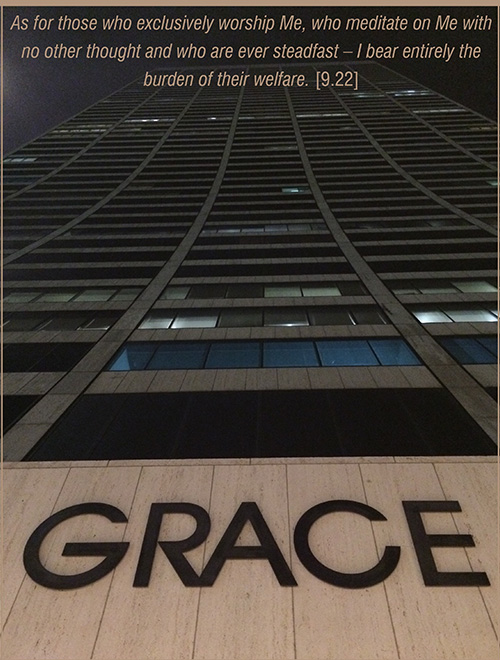 |
I hope you would etch this lesson in your Heart.
The Divine Assurances
Chapter 9 is also where the Lord gives many assurances. Of these Sloka [9.22] is very famous. In fact, I have made it my class prayer. It goes like this:
-
As for those who exclusively worship Me, who meditate on Me with no other thought and who are ever steadfast – I bear entirely the burden of their welfare. [9.22]
People often feel inadequate and disqualify themselves saying, “Oh, I am no good; God will not have time for me.” This is not true as should be evident from the following Sloka.
-
Even the vilest of sinners shall be counted as righteous, if he turns to Me with undivided devotion; for he has chosen the right path. [9.30]
Krishna continues:
-
Indeed, ere long he becomes fully spiritual, and eternal peace shall be his; O Kaunteya, know for a certainty that My Bhakta never perishes. [9.31]
-
By seeking refuge in Me, even those born of sinful parents and others usually considered not eligible shall reach the Supreme Goal. [9.32]
Can you get a better deal? Who says God is without compassion?
I cannot leave Chapter 9 without reference to a Sloka in which Krishna uses the words Anithyam asukham lokham, meaning that the world is transient and full of misery. I am drawing attention to these words because back in the good old days, Swami often used to make a reference to these words to drive home the point that if we take this world at face value, then we sure are in for trouble. The question arises, if the world is transient and full of misery then why on earth did God put us into it? Krishna answers that one. He says in effect, “Son, sure the world is transient and full of misery but those are the non-permanent aspects of this world. Remember, I always want you to focus on the permanent aspect. If you do that, you would realise that behind its transient façade, this world is actually a manifestation of Me. Once you are able to see the Divinity underlying the transient world, then your life would change. You would then automatically focus on Mama Dharma. That then would automatically hasten your progress towards Me!”
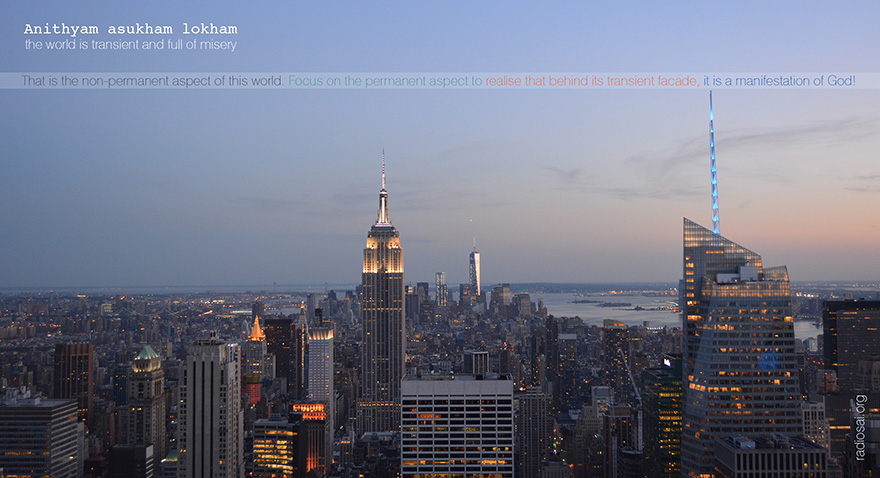 |
Hope all that is clear. So you see, one way or the other, it comes back to Mama Dharma! No wonder, because that after all is the core of the Gita!
Thanks for being with me. All the best. Jai Sai Ram.
| comments powered by Disqus |
What do you think about this article? Please let us know by writing in to h2h@radiosai.org. Do not forget to mention your name and country.






